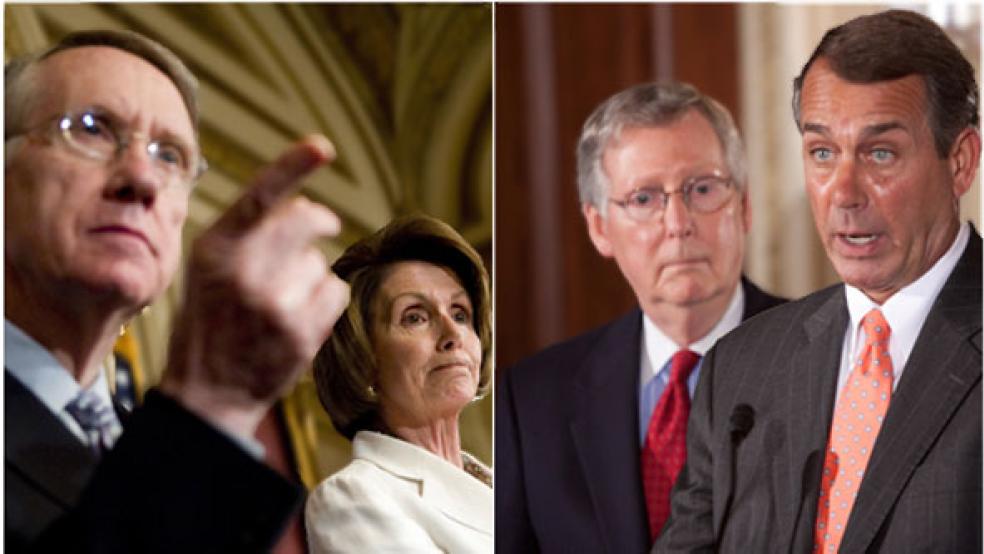As the Senate Budget Committee belatedly turns to drafting a fiscal 2011 budget later this week, Democrats face three serious issues that could lead to partisan dust-ups or intraparty controversies harmful to their prospects in the fall midterm elections.
Among Democratic leaders’ biggest concerns:
- Another $1.3 trillion budget deficit. Republicans and Tea Party protesters have blasted Obama and the Democrats for running up deficits well beyond those of the Bush administration, and many Democratic lawmakers are unwilling to vote for a new budget that projects another huge deficit.
- Spending requests for the war in Afghanistan – a philosophical issue as well as a fiscal one. Democratic leaders are worried about major divisions within their party over Obama’s handling of the war and his decision to deploy an additional 30,000 troops in that theater.
- Serious talk about entitlement reform or further efforts at containing long-term health care costs under Medicare and Medicaid. Many Democrats fear they have already hurt their re-election chances by supporting Obama’s health care overhaul legislation that calls for $500 billion in Medicare cuts over ten years, and are reluctant to consider further measures designed to slow the growth of government health care costs.
Since President Obama unveiled his $3.8 trillion budget proposal in January, a Congress preoccupied with health care, unemployment and financial reform has largely ignored the need for a budge resolution this year. There was some speculation that neither the Senate nor the House would approve a budget resolution this year because of the inherent political risks and because a bipartisan presidential commission will be offering suggestions for reducing the deficit late this fall. Precisely how the budget process and the work of the commission dovetails is another point of concern.
Bill Galston, a long-time budget analyst at the Brookings Institution, says Congress could continue to ignore the budget and fiscal situation until much later this year — possibly until after the November election. He said Democrats are politically damned if they do and damned if they don’t. “They may take a hit for not coming up with a budget, but they take a bigger hit if they do,” he said. “It’s not as though there’s a really good option for Democrats.”
Senate Budget Committee Chairman Kent Conrad, D-N.D., has promised to present a budget plan that would cut the deficit to 3 percent of the gross domestic product by 2015 — similar to the goal of the president’s fiscal commission. But he is keeping details under wraps until the committee meets midweek. Fiscally conservative Democrats might want to show more deficit reduction, while liberals are leery of cutting the budget during a recession and disproportionately hurting poorer constituents who are already suffering. And Senate Majority Leader Harry Reid, D-Nev., has not made the budget a top priority, at least between now and Congress’ next recess for Memorial Day.
There’s another reason Democratic leaders might want to put off action on a new budget. Obama's proposed freeze on domestic discretionary spending has gotten a very mixed reaction from rank-and-file Democrats. Liberals have criticized the president for excluding defense spending from the freeze, while conservatives have praised the overall idea, but have reservations about specific cuts. For example, his decision to cut funds for the NASA "return to the moon" program sparked outrage among the usual deficit hawks from Florida. Republicans, who failed to adopt budgets several times when they were last in power, are slamming the Democrats for doing the same thing now.
Rep. Paul Ryan, R-Wis., ranking Republican on the House Budget Committee, noted that when House Speaker Nancy Pelosi was in the minority, she chastised Republicans for abandoning their responsibilities and hurting America’s children. “Today, the echo of their words is deafening,” Ryan said. House Minority Leader John Boehner, R-Ohio, accuses Democrats of ignoring “the real problems: their unprecedented spending spree. Listen, our government is too big, is too costly and too arrogant,” he told reporters.
The budget committees in the House and Senate write spending blueprints for the rest of Congress to follow. The budgets set out a roadmap for spending and tax revenues and give marching orders to the Appropriations Committees on how to finish up their work by Oct. 1, the start of the new fiscal year. Sometimes, Congress passes “omnibus” spending bills at the end of a session, with billions of dollars in funding for government programs all wrapped up in a single, if untidy, package. In addition, Congress, under President George W. Bush, routinely passed supplemental appropriations bills to fund the wars in Iraq and Afghanistan to try to keep those huge sums off the regular budget. They were financed with borrowing. But this year, things look different.
The key question is whether there are enough Democrats willing to support a deficit-spending blueprint for fiscal 2011. House Majority Leader Steny Hoyer, D-Md., who is working with Budget Committee Chairman John Spratt, D-S.C., to round up Democrats of different views and test the waters, said it all depends on the votes.
“We have to see whether we have the votes to do so,” Hoyer said. “Obviously … it is difficult to pass budgets in election years because, you know, they reflect what is the status.” The “status,” of course, is that big, unpopular deficit. Hoyer noted that there have been other years in which there has been no budget approved for the following fiscal period — 1998, 2002, 2004 and 2006 — all election years and all years when Republicans controlled Congress.
Sen. Judd Gregg, R-N.H., the ranking Republican on the Senate Budget Committee, ruefully recalls the years when he was chairman and there was no budget. He said there are “very few” advantages to not having a budget, but if there is one, it’s political — that is, being able to avoid having to vote to take “the American people into fiscal insolvency.”




